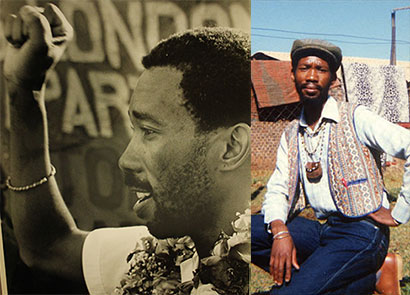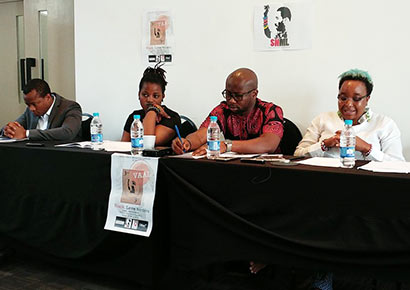Black, Love, Borders: “Long live the undying spirit of Simon Nkoli”

Simon Nkoli
“I am black I am gay. I cannot separate the two into secondary or primary struggles” – words uttered by the late activist Simon Nkoli.
The third annual Simon Nkoli Memorial Lecture was hosted at Constitution Hill in Braamfontein on October 8.
In an effort to challenge Lesbian, Gay, Bisexual, Transgender and Intersex (LGBTI) stigma, the lecture not only touched on Nkoli’s life, but was also informative through the discussion of issues that the LGBTI community still face in this current age.
LGBTI activist and Chief Executive Officer of Swell Communications Mpho Buntse said: “This year marks a momentous highlight in our journey since the inaugural lecture two years ago.
“Homophobia and discrimination against gays and lesbians is now more visible than ever before, especially in the black communities.
“African men are still in the closet about their sexuality because of the myth and a misconception that there are no gay men and homosexuality is not an African concept.”
Buntse said that these words were uttered by Nkoli at the opening of the Pretoria Gay and lesbian centre in 1998, “Eighteen years later we reflect on the statement and attempt to figure out whether the situation has changed,” he said.
As part of exploring Nkoli’s political contribution, the lecture focused on the following themes; HIV/AIDS – Men who have sex with men (MSM) African experience and a link to the recently held AIDS Conference discussions; Human rights freedom in relation to the continued LGBTI and Sexual Orientation Gender Identity (SOGI) discrimination and violence; and youth and liberation in relation to the continuous call for free education and trans- international solidarity.
In his discussion of HIV/AIDS – MSM African experience, Director of AMSHER, Kene Esom, said the juxtaposition of HIV and queer identity in Africa has led to the sexualisation of queer identity.
“This juxtaposition has reduced queer identity to sex and disease and it is important to interrogate how this has affected the discourse of queer inclusion, acceptance, and equality in many of our African contexts.”
Esom said that we need to interrogate the terms we appropriate to ourselves and our struggles much more deeply: “The term MSM strips the gay community of visibility and relevance… and it reduces the importance of gay communities and their associated human rights.”
“There are many ways these phrases which we adopt and carry shape our consciousness of those within our communities and those outside our communities,” he said.
Other speakers at the event – analyst, activist and lawyer Siboniso Cibane, Fees Must Fall activist Londeka Gumede and activist Doreen Jaura – shared light on further issues that affect gay communities.

The panelists: Siboniso Cibane, Londeka Gumede, Kene Esom & Doreen Jaura
Simon Nkoli was born in 1957 in Soweto but grew up in the Free State. He was among the few prominent gay anti-apartheid activists whose perspective on the world and activism cut across the spectrum. He was also a founder of the Gay and Lesbian Organisation of Witwatersrand (GLOW) and the very first Johannesburg Pride.
Nkoli was diagnosed as HIV positive while in jail, became an HIV/AIDS campaigner in South Africa and abroad and was also a leader of the Township AIDS Project. Nkoli died in hospital at the age of 41 on November 30, 1998, on the eve of World AIDS Day.
The memorial ended on a high note with a performance by Majola singing the song Simon Nkoli. Other performers included Amstel, from the gay group 3sum, as well as an emotional opening performance by Albert Silindokuhle Ibokwe Khoza.
“Long live the spirit of Simon Nkoli long Live,” said Buntse.
This article was first published by Soweto Urban.
Leave a Reply